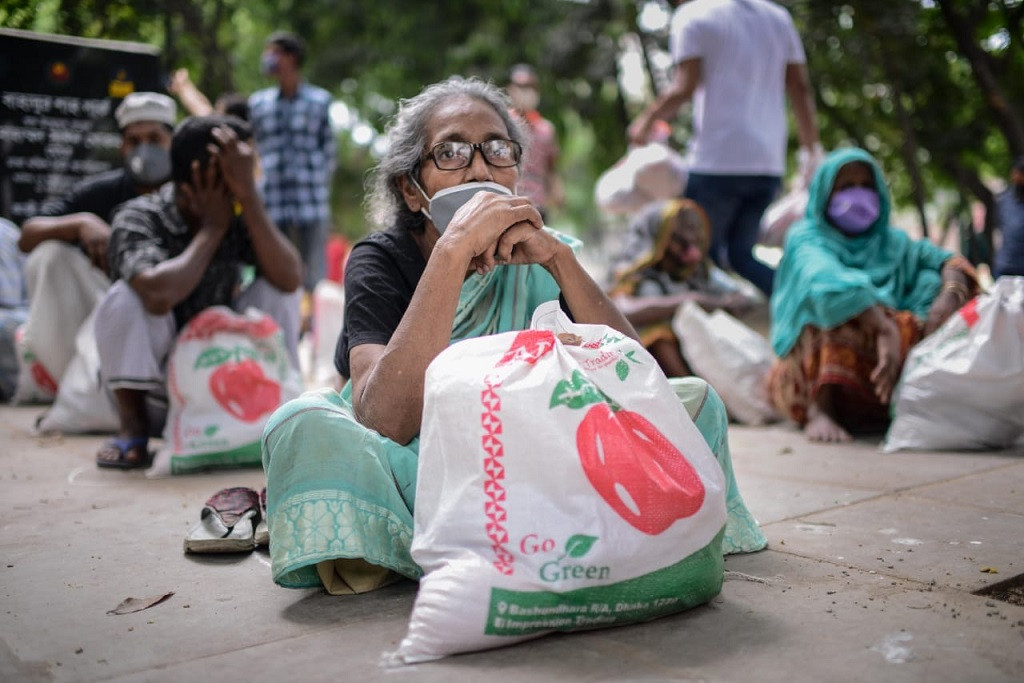
Study: Two-thirds of marginalised households deprived of Covid support
April 3rd 2022

More than two-thirds of marginalised households in rural areas surveyed between October and December 2021 last year have said that they did not receive any support amid the Covid-19 pandemic.
Of them, some 68% of rural communities, 62% slum dwellers, 74% plain land ethnic people, 28% hill tracts ethnic people, 63% female-headed households and 58% are persons with disability.
The findings were revealed during the Third Policy Clinic on the research, “Voices from the Margins and Inclusive Policy Responses to Covid-19 Pandemic”, organized by Centre for Peace and Justice of Brac University.
The key findings from the third round of the survey were presented by CPJ’s Senior Researcher Mrinmoy Samadder and research associates Nahida Akter and Hossain Mohammed Omar Khayum.
A Policy Clinic is an innovative method in which experts verify the evidence obtained from research and prioritise policy responses.
The sample size for the research was 1,533 households in the first round, 1,496 in the second round and 1,477 households during this third round of the survey.
During the research, it was seen that those who received support mostly got it from the local government. Most of the recipients were from the hill tracts ethnic communities while the least recipients were the slum dwellers.
The respondents in December 2021, however, said that only one-fifth of the households found local representatives by their side.
The highest 33% of ethnic hill tracts communities reported the presence of “local representatives by their side”, with only 13% for rural communities in December.
According to the study, some 96% of households experienced increased anxiety, while more than one-third had insomnia and one-fifth could not concentrate on work. Problems with food supply, and decrease in income were the major reasons behind the deteriorated mental health situations.
Education was also not spared. Compared to June 2021, the effect of the pandemic on education did not lessen in December 2021. Status of education was particularly concerning for slum dwellers and female-headed households, the research found.
Education was also not spared. Compared to June 2021, the effect of the pandemic on education did not lessen in December 2021. Status of education was particularly concerning for slum dwellers and female-headed households, the research found.
Education was also not spared. Compared to June 2021, the effect of the pandemic on education did not lessen in December 2021. Status of education was particularly concerning for slum dwellers and female-headed households, the research found.
The event was chaired by CPJ Executive Director Manzoor Hasan.
IEDCR Adviser Dr Mohammad Mushtuq Husain said that such information and findings from the CPJ research would help formulate necessary policy for marginalised people.
Chairperson of Save and Serve Foundation Syed Tayabul Bashar stressed the need for greater involvement of public representatives in vaccine deployment and information dissemination mechanisms.
Director of BARD Mizanur Rahman mentioned that the research could further explore the interplay between education and access to livelihoods, among other features.
International Consultant of the World Health Organization Taufiqul Joarder believes that education has suffered the most from Covid-19.
Also a vice chairperson of Public Health Foundation, Taufiqul said: “We need to address the limitations of general aid provision, and seek alternatives.”
The General Secretary of Bangladesh Society for Change and Advocacy Network, Salma Mahbub, said: “Persons with disabilities have suffered the most in terms of losing livelihoods. Their employment opportunities have been affected the most. The social safety nets promised to them have not yet been established. We must bring this to the forefront before the new budget is discussed.”
Zuam Lian Amlai, General Secretary of Bangladesh Adivasi Forum, said: “Since remote and distant areas do not benefit from government aid, we need to consider how to ensure that aid adequately reaches those regions.”
Joint Director of Rural Development Academy of Bogra Abdul Majid Pramanik said that people living in the “Char” areas had seen an increase in child marriages.
“They are unwilling to take the vaccines as it requires them to travel to the mainland to receive the doses. These issues need to be considered at all policy-making levels,” he added.